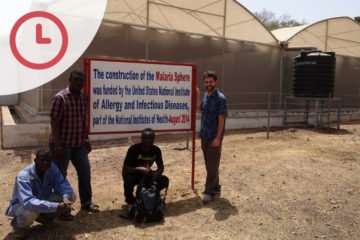Podcast Available on iTunes and Spotify.
Hello, I’m Thomas Locke and this is Five Minutes, the podcast that brings you closer to the people fighting malaria.
Today, I’m joined by Lukyn Gedge who is coordinating the Microbide Bucket Challenge in India. Her team is testing the efficacy of a new biodegradable larvicide that can kill mosquitos, releasing carbon dioxide and water into the atmosphere.
This is Five Minutes with Lukyn Gedge.
Lukyn, thanks for joining me.
Thank you, Thomas.
Previously on the podcast, I spoke with Mary Skelly, the CEO of Microbide. She told me about this new biodegradable larvicide and the test trials you’re currently doing in India. Could you tell me more about the Microbide Bucket Challenge?
The Bucket Challenge is as a way to really bring awareness to our early stage field trials for this larvicide and potentially bring support to fast-track its registration. As your listeners probably know, severe toxicity issues and increasing resistance to current products on the market means that serious attention is needed to address these growing new demands. Similar to the panic surrounding the need for new antibiotics, we need urgency in this emergency for anything to happen. Having obtained fantastic lab results, we now want to see how well the product works in the field and against the elements. Using plastic buckets as a surrogate breeding ground for exposing the larvicide to the Indian environment, a country where malaria is an endemic problem, in order to raise awareness and help malaria kick the bucket, so to speak.
We often hear about these laborious processes, how it is so complicated and slow to get things on the market. But we often hear about the significant costs to drug production in particular. What sort of financial costs are associated with the development of chemicals larvicides?
They’re really huge. For example, in the US, it takes on average 12 years and $250 million dollars to bring a product like ours to market. The global health industry, well those actually on the ground, are crying out for new products to aid vector control efforts. But these financial and regulatory barriers are massive impediments to lots of disruptive and innovative technologies,
especially emerging companies like ours.
You mentioned these 12 years, the patent for this technology was filed by Microbide 10 years ago in 2008. Do you think that, within the next two years, you can feasibly get this onto the market?
100%. We have global support from governments and individual private organisations who are really keen for us to succeed.
If these bucket trials are successful, what are the next steps for you?
We’ll be applying to the Indian CIBRC, which is the Central Insecticides Board and Registration Committee for licensing and distribution throughout India. We’ll also be pushing on with Phase 3 of WHOPES, the WHO pesticides evaluation scheme, essentially just larger scale field trials which are a necessary prerequisite for global entry into the insecticide market.
You say that you’re a Programme Coordinator and Analyst, what does that role entail with regard to the Bucket Challenge out in India?
Well, actually my role is very much an evolving one. I was brought on board to really help Microbide in all of its public health-related projects going on and I have since organised bucket trials, so essentially doing everything from writing the protocol for the bucket trials to organising the Bucket Challenge.
Lukyn Gedge, thank you.
Thank you, Thomas.
If you’d like to learn more about the Microbide Bucket Challenge, head to microbide.com


